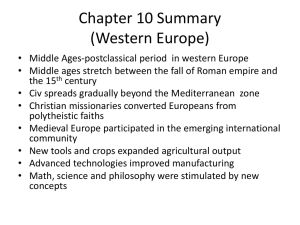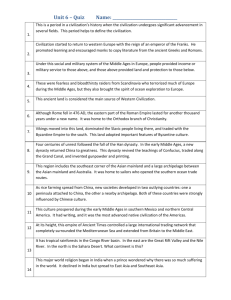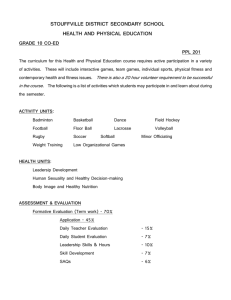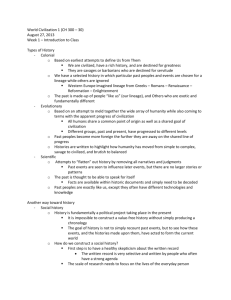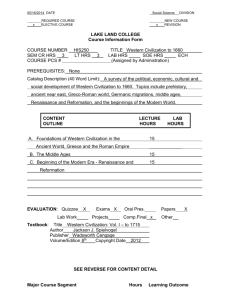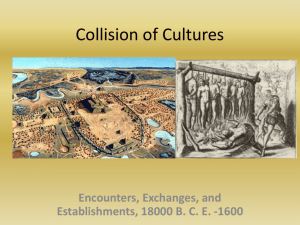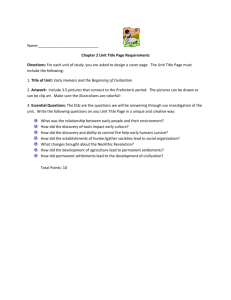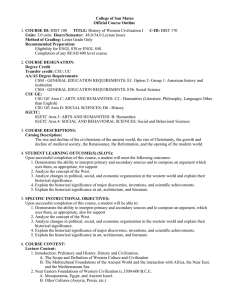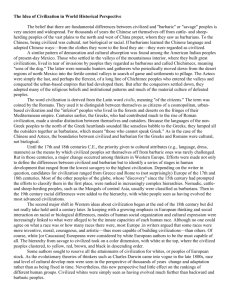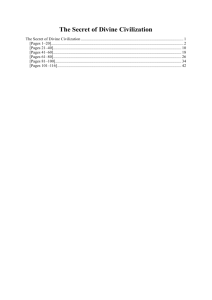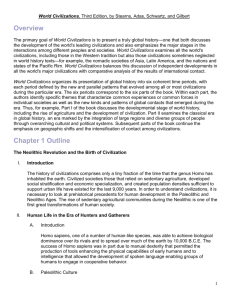GE-10-20. HIST 211 Western Civilization II: 1500
advertisement
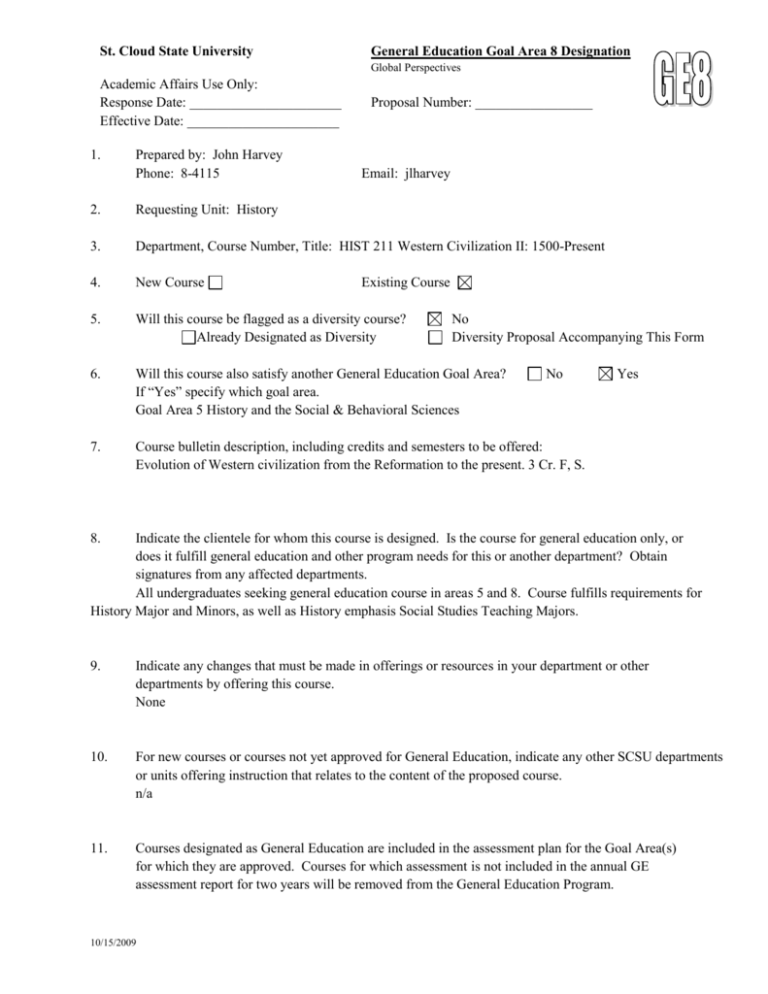
St. Cloud State University General Education Goal Area 8 Designation Global Perspectives Academic Affairs Use Only: Response Date: ______________________ Effective Date: ______________________ 1. Prepared by: John Harvey Phone: 8-4115 Proposal Number: _________________ Email: jlharvey 2. Requesting Unit: History 3. Department, Course Number, Title: HIST 211 Western Civilization II: 1500-Present 4. New Course 5. Will this course be flagged as a diversity course? Already Designated as Diversity 6. Will this course also satisfy another General Education Goal Area? If “Yes” specify which goal area. Goal Area 5 History and the Social & Behavioral Sciences 7. Course bulletin description, including credits and semesters to be offered: Evolution of Western civilization from the Reformation to the present. 3 Cr. F, S. Existing Course No Diversity Proposal Accompanying This Form No Yes 8. Indicate the clientele for whom this course is designed. Is the course for general education only, or does it fulfill general education and other program needs for this or another department? Obtain signatures from any affected departments. All undergraduates seeking general education course in areas 5 and 8. Course fulfills requirements for History Major and Minors, as well as History emphasis Social Studies Teaching Majors. 9. Indicate any changes that must be made in offerings or resources in your department or other departments by offering this course. None 10. For new courses or courses not yet approved for General Education, indicate any other SCSU departments or units offering instruction that relates to the content of the proposed course. n/a 11. Courses designated as General Education are included in the assessment plan for the Goal Area(s) for which they are approved. Courses for which assessment is not included in the annual GE assessment report for two years will be removed from the General Education Program. 10/15/2009 The Requesting Unit understands and recognizes the above conditions. 12. Provide a concise explanation of how the following goal is a “significant focus” of the proposed course. Goal Area 8: Global Perspectives Develop a comparative perspective and understanding of one’s place in a global context. Through the examination of “Western Civilization” students will acquire a familiarity with major events and figures across the European continent and its evolving relationship with the rest of the world, through such historical concepts such as empire, trade, religion, and immigration. The student will also develop skills in critical reading of both primary and secondary sources, in research, in the comprehension of textual and lecture material, in class discussion, and in the composition of essays. 13. In order for a course to be designated as fulfilling Goal Area 8, it must address at least 4 of the 5 student learning outcomes (SLOs) below. Check the SLOs below that are focused on in the proposed general education course. 1. Explain how they are connected and related to people elsewhere in the world. 2. Describe similarities and differences among global places and populations. 3. Analyze how political, economic or cultural elements influence relations among the world’s states, peoples, or societies. 4. Analyze specific international issues and propose and evaluate responses. 5. Articulate a vision of their individual roles and responsibilities in a common global future. 14. Discuss how each Student Learning Outcome checked above is achieved in this course. (Note: Although descriptions of typical assignments or types of assignments may be part of this discussion, it is not appropriate to submit copies of actual assignments.) 14.1 Students are introduced to the development of international cultural, social, intellectual, and political exchanges between the varied peoples of Europe since 1500, and the evolution of such relationships between the Europeans and the rest of the world. The parameters of this interaction are studied through topics such as global religion, empire, warfare, technological revolutions, and the rise of the modern consumer-industrial society. 14.2 Students in the course will encounter the opportunity to compare the cultural and social values that define the "European experience" with other non-European cultures since 1500. The course emphasizes the historical diversity of social experiences that emerge from the contact and mutual influences between European and non-European communities across the globe. 14.3 Students in the course will become very familiar with historical trends that impacted both the development of Europe and the wider world, especially through important thematic topics such as "the age of exploration," European empire, immigration, industrialization/urbanization, and the inter-relationships that are formed between Europeans and non-European peoples since 1500. 14.4 Students are asked to analyze how the historical issues of "European and the world" continue to effect the communities of the present. Historical issues such as industrialization and the evolution of urbanindustrial reforms in the nineteenth century, for example, or the origins of the global Great Depression between 10/15/2009 the world wars, are presented in the context of issues that students would encounter today, such as environmentalism or the need for international regulatory reforms in contmporary economies. 15. 1. 2. 3. 4. 5. 6. 7. 8. 9. 10. 11. List or attach the Course Outline (adequately described and including percentage of time to be allocated to each topic). Curriculum Committees may request additional information. Topics larger than 20% need to be broken down further. Indicate in your course outline where the Student Learning Outcomes checked above are being met. The Student Learning Outcomes are met throughout the curriculum described in the course outline below: Introduction 5% Reformation 10% Rise of Modern States 10% Scientific revolution & Enlightenment 10% French Revolution 10% Industrial Revolution 10% Imperialism and 19th-century culture 10% World War I 10% World War II 10% Cold War 10% Conclusions 5% 10/15/2009
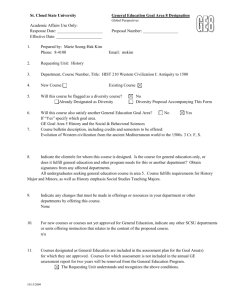
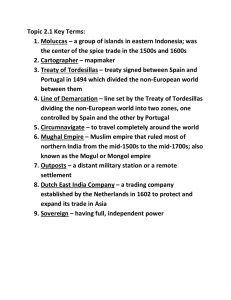
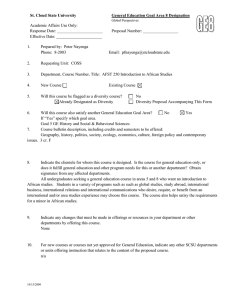
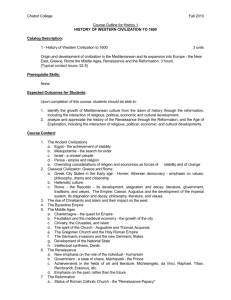
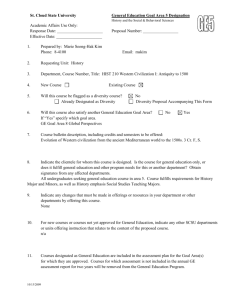
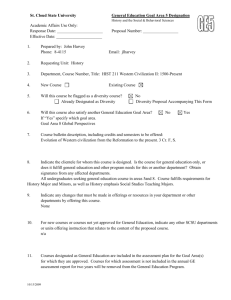

![Chapter 16, 18, 19, 20 Vocabulary potlatch [PAHT•LACH] n. a](http://s3.studylib.net/store/data/009447942_1-1f7cc4bb90d2e6d58999620c1c1ff1c6-300x300.png)
